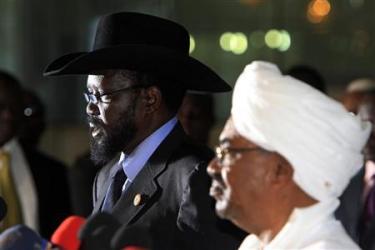Sudan President Omer Al-Bashir and his South Sudanese counterpart Salva Kiir Mayardit managed Thursday to strike a deal on border security issues
 Sudan President Omer Al-Bashir and his South Sudanese counterpart Salva Kiir Mayardit managed Thursday, after another round of marathon talks on Wednesday, to strike a deal on border security issues but failed to do likewise on the most contentious border regions including Abyei, Sudan Tribune news website reported.
Sudan President Omer Al-Bashir and his South Sudanese counterpart Salva Kiir Mayardit managed Thursday, after another round of marathon talks on Wednesday, to strike a deal on border security issues but failed to do likewise on the most contentious border regions including Abyei, Sudan Tribune news website reported.
The partial deal was confirmed by both countries following the sixth closed-door meeting between the two leaders in the Ethiopian capital Addis Ababa, which has been hosting the summit for the past five days under the mediation of the African Union High-Level Implementation Panel (AUHIP).
The former civil war foes have agreed on a package of deals that will ensure the newly separated nations "will thrive and become two viable states," African Union official Barney Afako said at the start of the signing ceremony.
The issue of establishing a demilitarized zone along the unmarked 1,800-km common borders has been resolved after the two countries agreed to redeploy their troops out of the 10 kilometers-buffer zone which includes the “Mile 14” area, a disputed territory occupying 23 kilometers between Western Bahr El-Ghazal State in South Sudan and East Darfur State in Sudan.
Under the deal, the South Sudan army (SPLA) should withdraw from six areas it controls along the borders, including “Mile 14”. Sudan’s army will also withdraw from “Mile 14” which, also under the deal, will revert back to being run through a traditional and joint administration system between Al-Riziygat Arab tribe of Darfur and Dinka Mulawl of South Sudan until such time that the area’s final status is determined.
The establishment of a buffer zone will enable the two countries to implement a deal they reached in August, but not yet signed, to resume exporting South Sudan oil via Sudan which will help their contracting economies after an eight-month hiatus that saw the two neighbours fight a brief war in April around border oilfields.
The deal, however, includes eight protocols on border security arrangements, oil, economic and trade issues, and the four freedoms agreement which will allow citizens of each country the freedoms of movement, property ownership, work and residence in the other country.
The implementation of those protocols should come into effect after being endorsed by the parliaments of both countries.